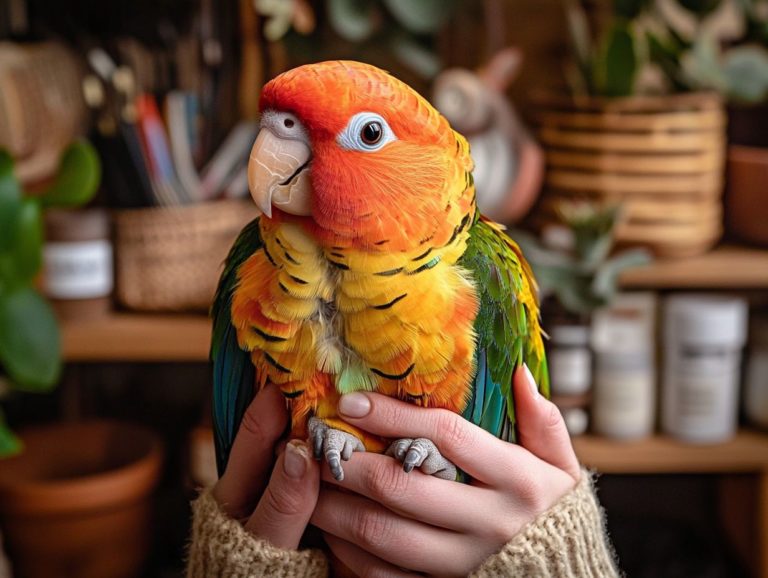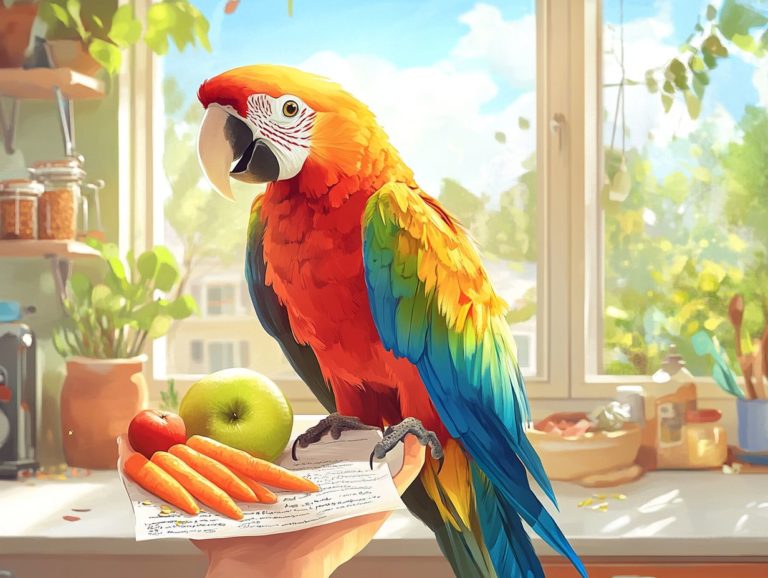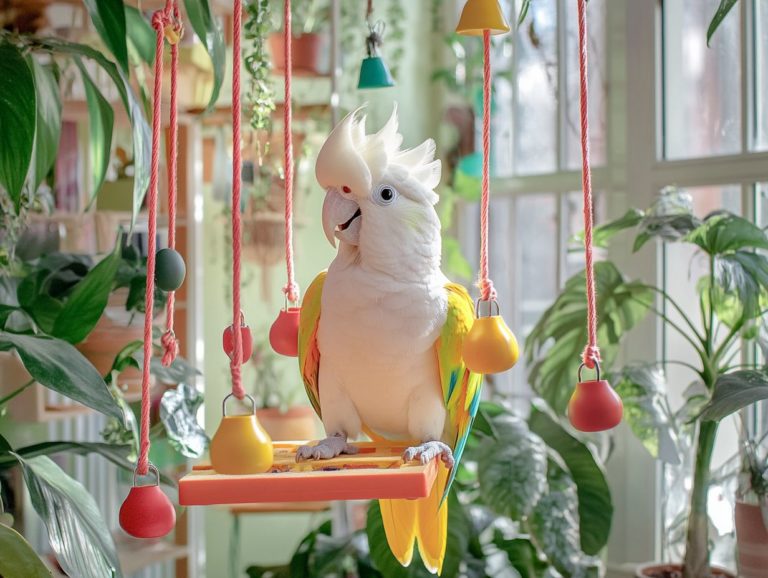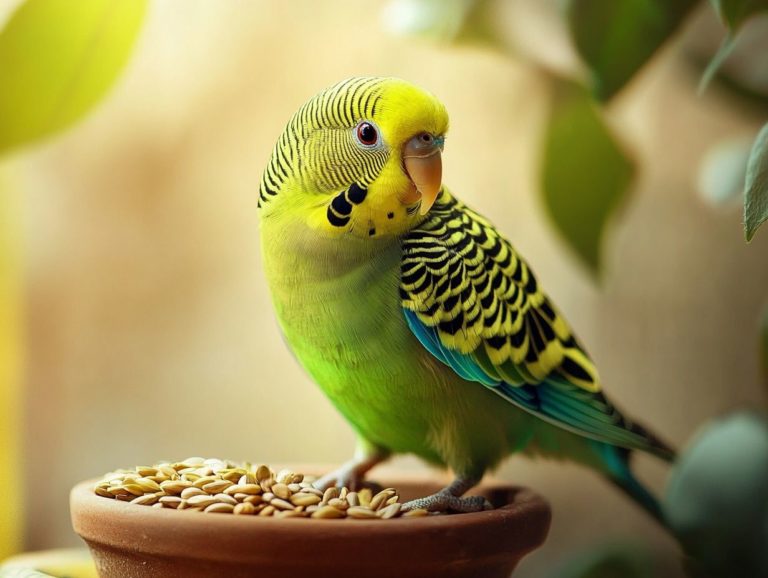6 Signs Your Cockatiel May Be Sick
Cockatiels are cherished companions, bringing an abundance of joy and affection into your life. Like any pet, they can face health challenges that often slip under the radar until it s too late.
This guide equips you with the tools to recognize signs of illness in your feathered friend, from subtle physical changes to noticeable shifts in behavior. You ll delve into common health concerns, understand when it s time to consult a veterinarian, and discover essential strategies for prevention.
With this insight, you can ensure your cockatiel remains happy and healthy for years to come, enhancing the bond you share.
Contents
- Key Takeaways:
- Understanding Common Health Issues
- Signs of Illness in Cockatiels
- Common Health Problems in Cockatiels
- When to Seek Veterinary Care
- Preventing Illness in Cockatiels
- Frequently Asked Questions
- What are the six signs that my cockatiel may be sick?
- How can I tell if my cockatiel’s appetite has changed?
- What kind of changes in appearance should I look out for?
- Are there any behavioral changes that could indicate sickness?
- What respiratory issues should I be aware of in my cockatiel?
- My cockatiel seems to be sleeping more than usual. Should I be concerned?
Key Takeaways:
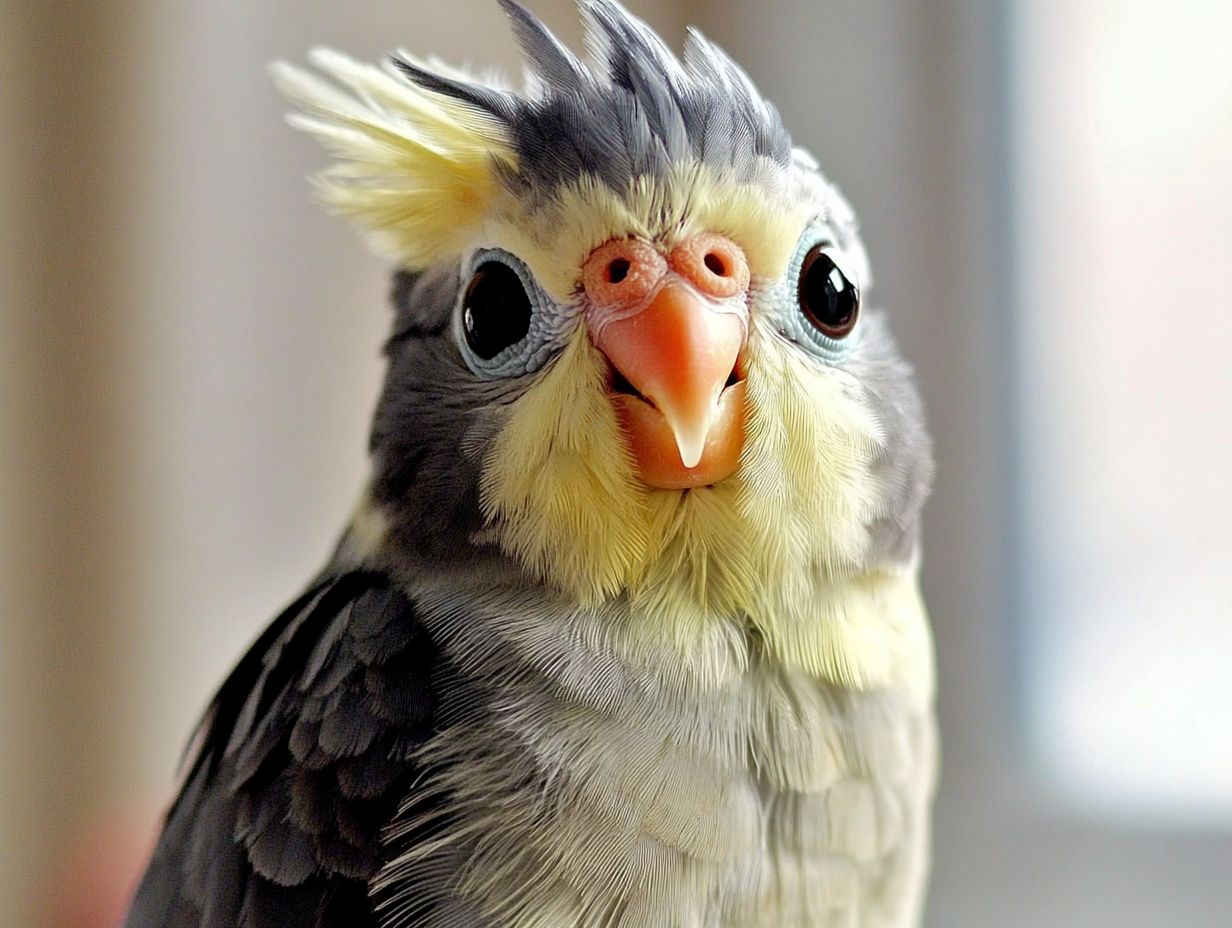
- Keep an eye out for physical and behavioral changes, such as weight loss, lethargy, and changes in vocalization, as these may be signs of illness in your cockatiel.
- Some common health problems in cockatiels include respiratory infections, nutritional deficiencies, and feather plucking. Pay attention to symptoms and seek proper treatment from a veterinarian.
- It is important to seek veterinary care immediately if your cockatiel shows signs of a medical emergency, such as difficulty breathing or sudden loss of balance.
Understanding Common Health Issues
Understanding common health issues in cockatiels is essential for you as a devoted pet owner. These delightful birds can display various symptoms when they re feeling under the weather, making timely diagnosis and medical care crucial.
By regularly observing your cockatiel’s behavior, you can catch potential health concerns early on. It’s vital to remain vigilant about any changes in your pet’s habits, feeding patterns, or overall demeanor.
These can be early indicators of illness that warrant a vet’s attention. To better understand your pet’s well-being, familiarize yourself with the top 10 signs of a healthy pet bird and consult an experienced veterinarian to ensure your cockatiel receives the highest quality care.
Signs of Illness in Cockatiels
Recognizing the signs of illness in your cockatiel is essential for ensuring quick help and effective treatment. Birds are masters at concealing their discomfort, but certain symptoms can reveal underlying health issues that demand your attention.
Common signs of distress include fluffed feathers, which may indicate that your cockatiel is unwell. Loss of appetite can lead to weight loss and malnutrition. Be on the lookout for signs of stress and anxiety, such as excessive vocalization or noticeable changes in behavior.
These signs mean your beloved pet may need urgent help from a vet!
Physical and Behavioral Indicators
Physical and behavioral indicators play a crucial role in gauging your cockatiel s health and deciding whether a trip to the vet is necessary.
In addition to the signs previously mentioned, keep an eye on feather quality; dull or ruffled plumage can suggest that your bird might be distressed or unwell. The condition of their eyes is equally important; cloudy eyes or excessive tearing could signal a serious issue that demands immediate attention.
When performing a physical examination, watch for signs of respiratory distress, such as wheezing or labored breathing these are key indicators of potential infections or other respiratory concerns. Changes in social behavior, like increased vocal mimicry or a newfound disinterest in interaction, can also shed light on your cockatiel s emotional state.
By understanding these nuances, you can significantly enhance the overall well-being of your feathered friend.
Common Health Problems in Cockatiels
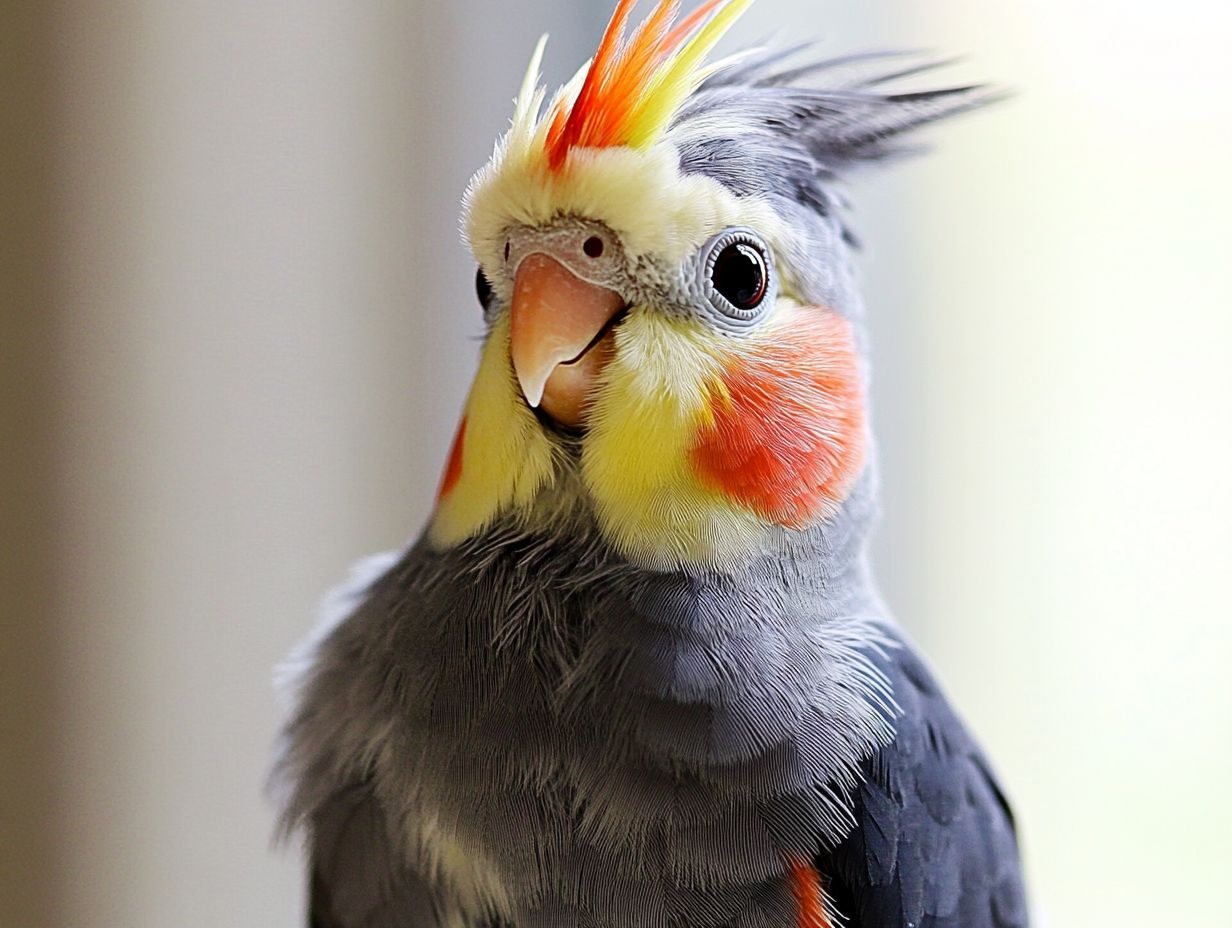
Common health issues in cockatiels can vary from minor inconveniences to serious conditions necessitating medical attention. For instance, conjunctivitis, commonly known as pink eye, is quite prevalent among pet birds and can lead to discomfort and vision impairment if not addressed promptly.
Other ailments might reveal themselves through changes in behavior or physical appearance, signaling the need for diagnostic tests from a qualified veterinarian. By understanding these potential health problems, you equip yourself to seek timely treatment, which is essential for the well-being of your cherished cockatiels.
Symptoms and Treatment Options
Identifying symptoms in your cockatiel is crucial for determining the right treatment options to ensure their health and happiness. Keep an eye out for signs like fluffed feathers or loss of appetite, as these can signal underlying issues needing your immediate attention.
Watch for other health concerns, such as excessive sleeping, changes in vocalization, or unusual droppings. Each of these could indicate infections or that your bird is not getting the right nutrients. By closely monitoring their behavior, you enable early intervention, significantly enhancing outcomes. If your feathered friend shows concerning symptoms, contact your veterinarian right away!
Treatment options vary depending on the diagnosed illness. These can range from medications to diet adjustments or changes in their environment. For example, respiratory issues might require antibiotics, while feather plucking could call for behavioral therapies.
Regular check-ups and diagnostic tests will further support your cockatiel s health, helping you foster a strong bond of care and awareness with your avian companion.
When to Seek Veterinary Care
Knowing when to seek veterinary care for your cockatiel can greatly impact their overall health and recovery. If your cockatiel displays alarming symptoms like difficulty breathing, excessive bleeding, or sudden behavioral shifts contact your veterinarian right away!
Experienced veterinarians often advise pet owners to trust their instincts. If something feels off with your pet s behavior or health, don t hesitate to seek help. Timely intervention can prevent minor health concerns from becoming significant issues.
Recognizing Emergency Situations
Recognizing emergencies for your cockatiel is vital to ensure they receive prompt care when needed.
While severe lethargy, labored breathing, and uncontrolled bleeding are obvious red flags, other symptoms also need immediate veterinary attention. Sudden changes in droppings, signs of a stroke like head tilting or any indication of injury, such as limping or swelling, should not be overlooked.
Effective communication with your veterinarian is essential. Sharing detailed observations about your pet s behavior and symptoms can lead to a more accurate diagnosis. Recognizing that rapid weight loss or frequent vomiting might signal serious health issues helps you respond quickly. Taking timely action not only eases pain but also paves the way for a successful recovery.
Preventing Illness in Cockatiels
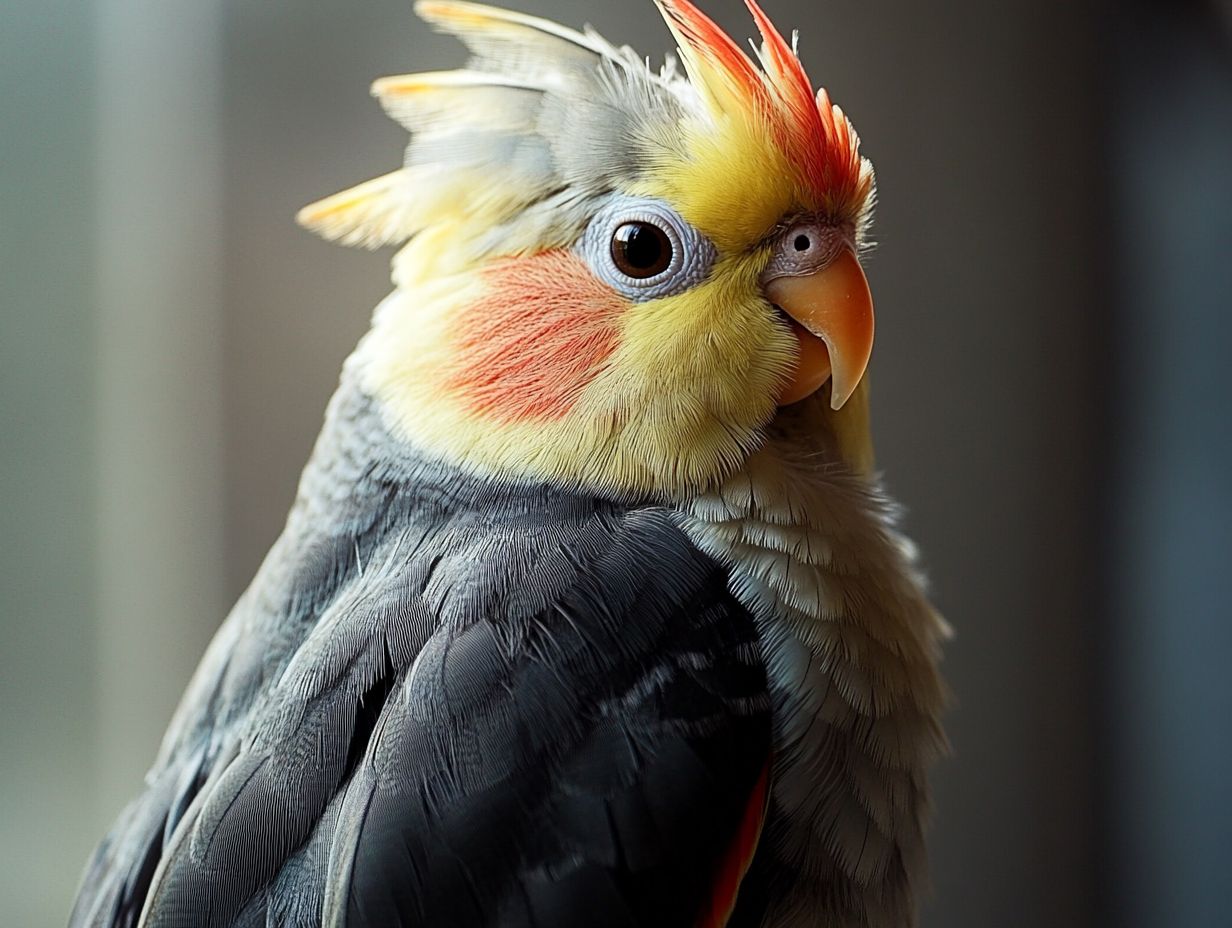
Preventing illness in your cockatiel goes beyond recognizing symptoms; it involves proactive measures that enhance their overall health and well-being. A well-balanced diet, clean living conditions, and regular social interaction can greatly reduce health risks for these delightful companions.
Minimizing stress and anxiety through thoughtful environmental enrichment and a consistent routine is crucial for your cockatiel’s health. Consulting with an experienced veterinarian can provide valuable insights into effective preventative strategies tailored to your pet’s unique needs.
Tips for Maintaining Good Health
Maintaining good health for your cockatiel involves several key practices. These practices ensure both their physical and emotional well-being.
A balanced diet brimming with nutrients, along with fresh fruits and vegetables, is essential for their vitality.
Regular exercise through playtime outside the cage and social interaction keeps your cockatiel active and engaged.
Prioritizing proper hygiene and scheduling regular veterinary check-ups can help catch potential health issues early, allowing for timely interventions.
To enhance your cockatiel’s quality of life, consider providing a variety of toys that stimulate their natural instincts and curiosity. Rotating these toys regularly will maintain their interest and promote mental agility.
Monitoring their weight is crucial, as obesity can lead to significant health problems.
Keeping a clean living environment is equally important. Regularly changing bedding materials and sanitizing food and water containers will contribute to their overall health.
Providing opportunities for socialization whether through interaction with humans or other birds can boost their mood and reduce stress.
By incorporating these practices, you ll create a lively and loving home for your feathered friend.
Caring for Your Cockatiel’s Health
Caring for your cockatiel’s health requires a complete care approach that includes proper nutrition, regular veterinary care, and a watchful eye for any changes in behavior or appearance.
Consulting with an experienced veterinarian provides tailored guidance, ensuring your cockatiel receives the medical attention it needs when necessary.
Regular check-ups and consultations can help in the early diagnosis of potential health issues, allowing you to remain proactive in your pet’s care.
Understanding the dietary needs of these charming birds is crucial. A well-balanced diet rich in seeds, pellets, fresh fruits, and vegetables significantly contributes to their overall health.
Pay attention to changes like feather loss, unusual vocalizations, or shifts in eating habits; these provide vital clues about your cockatiel’s well-being.
Establishing a routine for health assessments at home can help you spot any irregularities sooner. It’s also important to stay informed about common cockatiel health issues and seek professional expertise promptly.
By doing so, you enhance the longevity and quality of life for your delightful feathered companion.
Frequently Asked Questions
What are the six signs that my cockatiel may be sick?
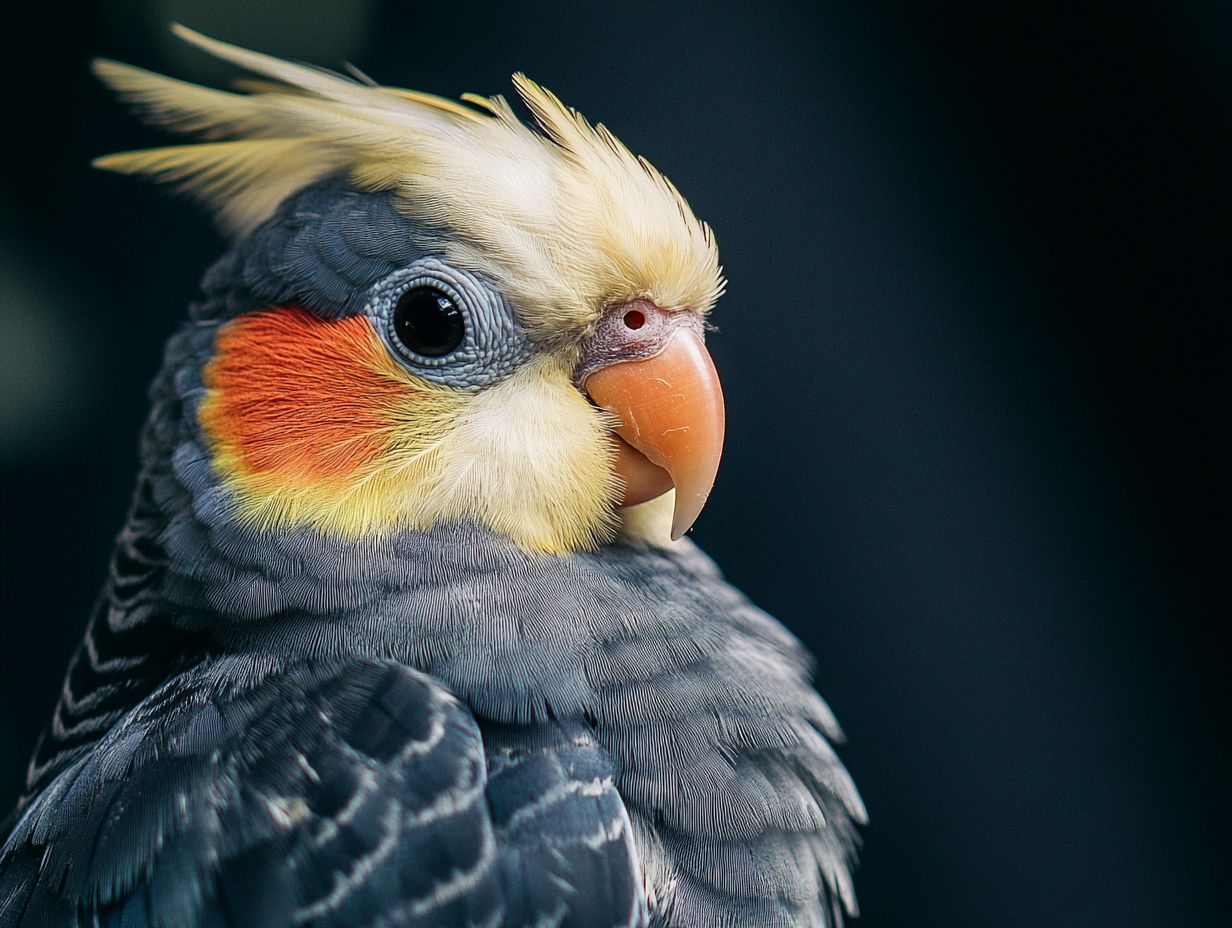
The six signs that your cockatiel may be sick are:
- Changes in appetite
- Changes in appearance
- Changes in behavior
- Respiratory issues
- Excessive sleepiness
- Changes in droppings
If you notice these signs, it may be time to consult a doctor for appropriate care, as they can help identify issues that may relate to larger animal health concerns.
How can I tell if my cockatiel’s appetite has changed?
If your cockatiel is eating significantly less or more than usual, it could be a sign of illness. Monitor their normal eating habits and watch for any changes.
What kind of changes in appearance should I look out for?
Any changes in your cockatiel’s feathers, eyes, or skin can indicate illness. Look for dull or ruffled feathers, discharge from the eyes or nostrils, or any unusual growths.
Are there any behavioral changes that could indicate sickness?
Yes, behavioral changes such as decreased activity, lethargy, or excessive aggression can all be signs that your cockatiel is not feeling well.
What respiratory issues should I be aware of in my cockatiel?
Coughing, sneezing, wheezing, or difficulty breathing can indicate illness in your cockatiel. If you see any of these signs, it’s important to know how to tell if your bird is sick and seek veterinary care immediately.
My cockatiel seems to be sleeping more than usual. Should I be concerned?
Yes, sleeping more than normal can be a sign of illness. Keep an eye on their sleep patterns, and if you notice a big change, get them checked by a vet.



